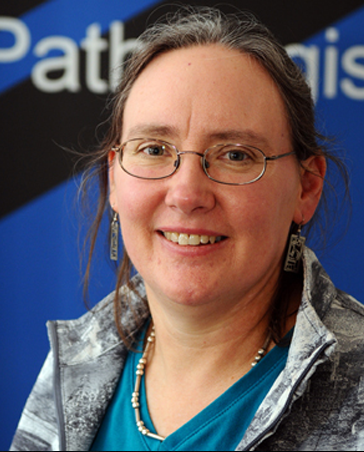Dr Kimberly Gilmour, Consultant Clinical Scientist in Immunology
Immunology first developed a firm clinical base during World War Two, when skin grafts given to injured soldiers failed to take properly and immunologists discovered that the immune system was the root of the problem. Today, immunology is an area of rapid scientific progress that frequently features in the national news – most recently relating to new cancer therapies. We speak to Dr Kimberly Gilmour about her work in this specialty.
Take us through a typical day for you…
I begin by cycling to work, where I start many mornings reading through my e-mails. In conjunction with genetics, I run a national service diagnosing patients with defects of their immune system (the patients get severe and frequent infections). I answer several e-mails advising about appropriate testing and sample requirements.
I then attend ward rounds where we discuss both in-patients and out-patients. We evaluate their diagnosis, current treatment and future management in a multi-team setting consisting of nurses, doctors, psychologists, pharmacists and scientists.
During lunch, I sometimes listen to talks by external speakers and then attend a brief meeting of scientists involved in gene therapy to ensure that we are prepared to treat patients the following week. After lunch, I analyse patient results as many of the tests we do are qualitative rather than quantitative. All molecular immunology qualitative test results are reviewed by two people – immunology consultants or clinical scientists, to ensure results are accurate. Any abnormal result must be phoned through to the referring clinicians and further tests and/or therapy will be discussed with them.
What do consultant clinical scientists in immunology do?
Consultant clinical scientists in immunology work in teams made up of clinical scientists, biomedical scientists, doctors and other healthcare professionals. They are based primarily in the laboratory, requesting, analysing and interpreting complex tests. An important role is providing direct advice to hospital and primary care doctors and other healthcare professionals, but they can also be involved in ward rounds and will contribute to multi-disciplinary team meetings.
Outside of care settings, consultant clinical scientists attend departmental and management meetings, contribute to and publish research, and attend and present at relevant scientific meetings. They may play a role in immunology nationally, through professional bodies such as the Association of Clinical Biochemistry and Laboratory Medicine and the British Society of Immunology. Teaching can make up a significant part of the job - consultant clinical scientists may run professional development sessions and training in immunology for medical students, healthcare professionals and trainees, as well as lecturing undergraduate and postgraduate students.
Later in the afternoon, I return to my work in the immunology laboratory where we are currently developing a new test for analysing how well immune cells can kill other cells. Patients who lack killing cells are prone to infection, malignancy and have a dysregulated immune system. Once the new test is validated, it will be routinely used; this will be better for patients as currently patient samples have to be sent to Germany which is time consuming and costly.
After processing more samples, reviewing patient results, writing letters about patients, answering telephone queries from doctors and laboratories around the UK, I return to my office, check my e-mails, shut down my computer and then cycle home though the evening mist.
What do you enjoy most about your job?
I love the variety of work. No two patients are the same and no two days are the same. I also enjoy being able to apply science for the benefit of patients. The combination of research and clinical is exciting.
Can you give us an example of an interesting case you recently worked on?
Recently, there was a baby with probable SCID (severe combined immunodeficiency) – children who are unable to fight infections and would die without a bone marrow transplant or gene therapy. I suggested the appropriate diagnostic tests and arranged for blood to be sent to the immunology laboratory.
One of the doctors in training had to take my blood to serve as a control sample for the requested tests. Control samples are important because they ensure that the tests work and any abnormalities found are due to defects in the patients and not because the assay failed. We showed that the baby lacked T cells and a protein called the ‘common gamma chain’. This means the baby has X-linked SCID and will either need gene therapy or a bone marrow transplant.
Do you have any favourite memories you could share with us?
I am fortunate to have many exciting memories. I was one of two clinical scientists who manufactured the cells for treating the first X-linked SCID baby in the UK with gene therapy – that boy is now 17 years old. Since then I’ve been involved in many 1st in human trials, including gene therapy for other immunodeficiencies.
I also used a new test I developed to diagnose a rare condition X-linked lymphoproliferative disease in four boys all from the same family. Knowing this diagnosis enabled the family to have optimal therapy and a bone marrow transplant – and all four are alive and well today. We are now developing gene therapy for this disease.
What advice would you give students entering your field?
For whatever career you chose, ensure it is something you are interested in. If clinical science interests you, read about different types of science (immunology, haematology, chemistry, genetics, etc.) and try and visit different laboratories (both research and clinical) to understand how they work and what the differences are. There are many points of entry into healthcare science including apprenticeships… Enthusiastic, competent scientists are always needed.
